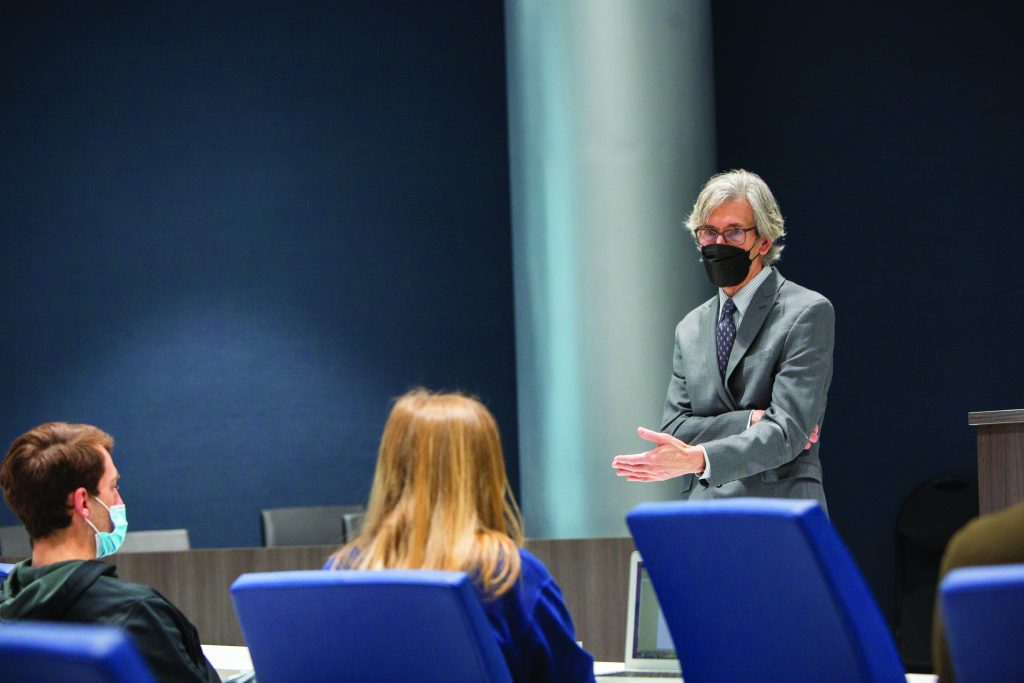By Katharine Gammon
Alex Cheesman has a full load of classes at the School of Law, but also has a vital role preparing legal motions for tenant cases where he must manage his time because the court moves fast. The broad strokes are the same in his cases: typically they involve someone who has been hit hard by the COVID-19 pandemic, is low on money and struggling with a potential eviction.
Cheesman is part of the law school’s free legal clinics, and he’s committed to learning by doing. He heard from other students that it was a great introduction to practicing law. “We spend all our time sitting in a classroom, we’re not doing the things lawyers do, in general,” he says. “All that class learning feels kind of vague: ‘We know what the law is, but how do you practice it?’”
Seton Hall professors and law students have worked with local residents for years to help them navigate the arena of tenant rights — most recently helping people apply for and make full use of governmental eviction protection assistance and earlier representing tenants in a class action suit to address poor living conditions.
The school is also expanding its legal aid work in housing and tenant rights due to recent grants. New projects include collaborating with other law schools to expand coverage and incorporate new technology to vary the type of assistance given and help more people.
Last year, the New Jersey State Legislature passed a law to fund programs to provide legal services for low- and moderate-income tenants in need of housing assistance, explains Lori Borgen, associate clinical professor and director of the Center for Social Justice.
Through this funding, the University’s School of Law and Rutgers University Law School have established the New Jersey Housing Justice Project, which lets the schools expand their clinical programs and represent more tenants than ever before. “It’s a combination of training students, legal services and advocacy,” she says.
The services are more needed now than ever. Kevin Kelly, an associate clinical professor in the law school, has been practicing tenant law since 1984, and feels the eviction crisis is reaching a new threshold. “This is the worst that I’ve seen,” he says, noting that the supply of housing has dwindled, making it harder for low-income people to find a place to live. Forces like gentrification also have made it more challenging for low- and even moderate-income folks to find a place to live, Kelly adds. “People who used to be considered middle class are feeling the squeeze.”
The law clinic gets referrals from a variety of places, but often from someone in the court system or private attorneys — and usually because someone has an eviction case coming up fast. The stories often revolve around health issues and the pandemic, when people fell behind on paying rent. One recent case concerned a man who was in the hospital and out of work for a while, missing a few months’ rent.
Such cases can go to court lopsided, Kelly says, when the landlord has an attorney and the tenant doesn’t. “If the judge doesn’t ask questions that probe further, the tenant could be evicted and he’s out basically within two weeks,” he says. “That’s how fast the process works.” The law clinic represents people and argues before the court — reminding judges of new laws that have been passed, like rules forbidding evictions for people who have failed to pay rent that accrued during the eviction moratorium.
The new laws are long and confusing, so Kelly doesn’t fault judges who don’t know the intricacies of all of them. But without an advocate on the tenants’ side, bad things can happen. “It’s not through malevolence, not through incompetence, but just the crush of tenancy cases.”
The law clinic can also help tenants apply for rental assistance, through the state or local municipalities — so landlords can get some relief, too. After all, Kelly says, displacement isn’t good for landlords or tenants. “It’s not helpful to landlords to have to keep spending their time renting apartments to people if they can keep otherwise desirable tenants.”
In addition to evictions, the team also works on poor living condition cases — situations that the pandemic has also worsened, Kelly says. Since landlords haven’t been getting as much income in rent, they have less money to devote to maintaining the buildings. “We’re starting to see a lot of cases where someone doesn’t have heat, or the landlord is not sending the exterminator out like they used to,” he says.
 Kelly has special knowledge of this area of law: He has been working on legal cases related to housing conditions for years. In 2017, he helped a young mother of four named Yanira Cortes with a case. The family was living in a subsidized housing unit that was overrun with rats, had broken windows and smoke detectors that didn’t work. She ended up moving out of the building due to the conditions.
Kelly has special knowledge of this area of law: He has been working on legal cases related to housing conditions for years. In 2017, he helped a young mother of four named Yanira Cortes with a case. The family was living in a subsidized housing unit that was overrun with rats, had broken windows and smoke detectors that didn’t work. She ended up moving out of the building due to the conditions.
The Seton Hall clinic was co-counsel on her case, Cortes says. “They were basically in charge of almost everything: investigating, finding evidence, discovery, getting information, making phone calls, so basically everything my lawyer needs help with, they are there to pick up any slack.”
She says it’s been a joy to be part of the students’ journey into hands-on learning before they graduate law school. Over the years, she met many of them and watched a new batch learn each semester. “I think they’re doing a phenomenal job, I’m grateful to have met them, and my life has changed by going through this,” she says. “I hope they are able to help other people in the future.”
Kelly says it’s exciting because while class action lawsuits are rare in landlord-tenant law, Cortes’ case can be a blueprint for future legal action. The 82-unit building meant that 82 families were eligible for the recovery. “Class actions are brought all the time,” he says. “But they’re not brought very often in housing cases, so this was really novel.” Now that the settlement is finalized — with the $110,000 amount (less costs) to be allocated to Cortes and about 40 other tenants — the new owners have also promised that they will be rehabilitating the building. Neither Cortes’ private attorney, Dennis Geier, J.D. ’06, or the clinic requested attorney’s fees.
Students working at the law clinic are able to recognize the direct outcomes of their work. It’s not like doing behind-the-scenes work at a big law firm and then handing off their findings to an upper-level lawyer. In the clinic, the students are interviewing clients, drafting papers, negotiating with adversaries, arguing in court and sometimes even conducting the trial. “We are there as their safety net, but they’re properly trained and they put in the work,” Kelly says. “They’re the lawyer. It’s like being in residency in medical school.”
Borgen says she hopes to secure additional funding for fellowships to bring more attorneys to New Jersey to do low-income tenant law. She also noted that the housing work has expanded to include health justice, since so many eviction cases are tangled in a person’s access to health care.
Simply having access to an attorney in these cases makes a huge difference, she says, pointing to New York City’s establishment of a right to counsel — which paradoxically dropped the number of eviction filings that were being seen in the court. In part, that’s because suddenly all the documents were being examined carefully — were landlords acting legally? Were these dwellings registered?
 The law school clinic plays a role in shaping the future of the eviction process, simply by giving more people access to legal counsel, she says. “What we’re looking at here is landlord tenant reform, and can we design a system that works for more people, and that is supporting tenants rights. We’re hopeful that we can have an impact on that.”
The law school clinic plays a role in shaping the future of the eviction process, simply by giving more people access to legal counsel, she says. “What we’re looking at here is landlord tenant reform, and can we design a system that works for more people, and that is supporting tenants rights. We’re hopeful that we can have an impact on that.”
Alex Cheesman has felt the impact of doing tenant law on his own career goals and aspirations. Over the past few years, more students have become interested in staffing the clinic, and this year the program had a waitlist for law students. With the additional state funding, the Center for Social Justice added students and expanded the number of clients they could take on. Many students want to experience what it’s like to actually be a lawyer, Cheesman says.
“I’ve never seriously considered going into public interest law; I always wanted a more private law route,” he says. “But seeing how fulfilling it is, it’s definitely something I would highly consider now. You’re not just working for a company; you’re working for an individual. The stakes are high, but the payoff is high.”
Katharine Gammon is a freelance writer based in Santa Monica.







